Strategic Management Assignment: Market Expansion OfFord Motors In Iceland
Question
Task:
You are required to research a multinational company of your choice (Ford Motor Company) You are required to analyse the strategic activities and decisions of a multinational company of your choice to establish a subsidiary in an international location. (Iceland). Please note that the MNC must not have a presence established in your target international location and you will be required to demonstrate this as part of your report.
Your strategic management assignment should highlight, analyse and critically evaluate the following:
i. Reasons for parent company’s international expansion; (including an evaluation of the company’s historical performance, products/service range, share of the market and competitive position within the industry);
ii. Possible strategic choices available to the parent company;
iii. Reasons for choice of location for the subsidiary;
iv. Strategic methods of entry and the possible consequences;
v. The potential organisational and managerial problems for the subsidiary operating in the new international environment; and
vi. You should provide strategic advice for the subsidiary to overcome the problems highlighted in v.
The paper should be based on a thorough research of various types of data such as library sources, company documentation, web-based material, personal experience in a company and personal interviews if applicable. Appropriate academic theories and models MUST be employed wherever relevant.
Answer
Introduction
Ford Motor is one of the largest operators in American automobile industry, which designs, services and manufactures a range of utility vehicles, trucks, Lincoln-luxury vehicles and cars. At present it operates in the three segments which are mobility, ford-credit and automobile. It operates in approximately 125 countries across the world and some of these include France, America, Brazil, and Thailand. In 2020, it was able to generate huge revenue of $127,144 million (Fortune, 2021). This company’s competitive-advantage is basedfundamentallyupon high and stable sales, innovation, customer loyalty, which build up its ability of further internationalisation. Aim of present report is to analyse decisions and strategic activities of this company for establishment in Iceland.
1. Reason for internalisation based upon HQ data
a. Headquarter market and company’s performance
Ford Motor is headquartered in America and as of 2020; it has generated a market share of 13.87% in this country (Statista, 2021). As shown in figure 1, there was a decline in market share of this company in 2020 as compared to that in 2019. However, it still became America’s top auto-marketer in 2020 as it assembled approximately 1.7 million of vehicles in 2020, which were 188,000 more as compared to other auto marketers in America. In first quarter of this year, it has reported approximately $ 36.2 billion, which is higher as compared to previous year, reflecting a surge in its performance and market share.
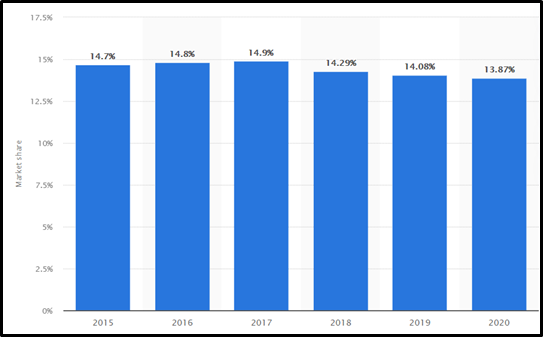
Figure 1: Market-share of Ford Motors in America
(Source: Statista, 2021)
Apart from this, it has also focused on investing at least $2 billion in its manufacturing operations in America for developing its market further in this country (Media.ford, 2021). Hence, it shows that this company has satisfactory performance in America. However, it is essential to enhance global presence for enhancing productive capacity and revenue of this organisation and for this, Ford needs to focus on internationalising its business in countries where growth potential is high. Iceland car-market has experienced a boom in recent years which makes it an appropriate option for Ford Motors to internationalise its business in this country to increase profitability. Therefore, it is evident that Ford motor is able to cope with challenges in the external environment and hence, it has ability to enhance its international presence.
b. Competitor Analysis
Ford has strong rivals in its market and these include Honda, Toyota, Nissan, Chrysler and so on. Major competitors of this organisation are presenting strong competitive force through reduction of sales rate. However, as this company is operating in an oligopoly-competitive market in which all players prefer non-price-competition, which makes them work successfully (Wang and Werning, 2020). In its market, different substitutes are available as all its competitors are continuously coming up with new product strategies for attracting new customers and gaining their loyalty. For this, Ford always focuses on producing innovative car-models to attract new generation and compete successfully in market. Drivers of Ford’s competitive advantage include its differentiation approach and its continuous focus on cost-leadership that help this company to respond effectively to the new changes in its market. Although in oligopolistic market, competitors do not focus on adopting a low-cost strategy; however, Ford has adopted this strategy and provides its products at cheapest possible prices. Fundamental objective of this company has always been producing affordable cards that working-class Americans can be comfortable with. It has been a major driver of its competitive advantage. Hence, in Iceland, it will be able to attract a big market by offering products for customers belonging to all income segments and it enhances opportunities for internationalisation. Fierce competition in Iceland’s market will push innovation and will enhance chances of building capability of increasing competitive edge, which is also a good reason for internationalisation in this country.
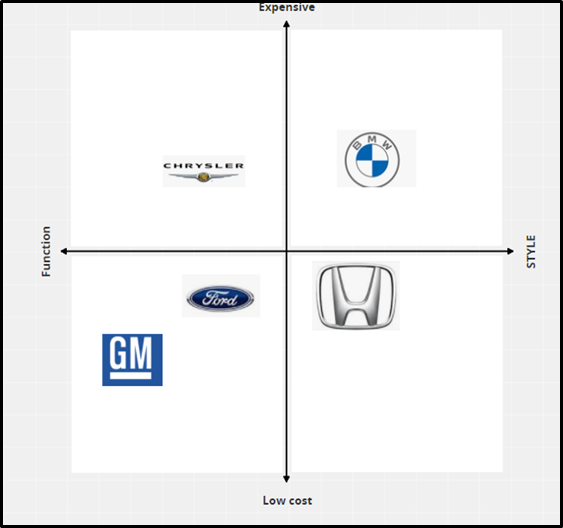
Figure 2: Perceptual Map
(Source: Author)
c. Porter’s Diamond
Four attributes of this model include demand conditions, factor conditions, supporting industries and rivalry with firm strategies. In America, this company has been able to get access to skilled labours well-placed infrastructure and many more inputs of factor-condition that helped to grow significantly. In Iceland, there has been a growth in demand for EVs and infrastructure network has been developed significantly (Theicct.org, 2018). Presence of demand of sophisticated customers makes Iceland a suitable country for expansion as well. As shown in figure 3, demand for electric cars is increasing rapidly in Iceland. Hence, Ford has an opportunity to grab a large market by offering innovative electric-vehicles.
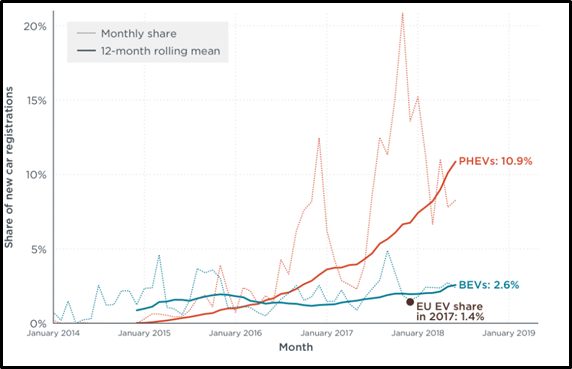
Figure 3: Shares for registration of new cars
(Source: Theicct.org, 2018)
Domestic-competition of this company is high that pushes it to come up with innovative products and strategies that are important drivers of expansion in international-arena. Presence of a huge number of suppliers in this country enhances opportunities for innovation through higher quality inputs.
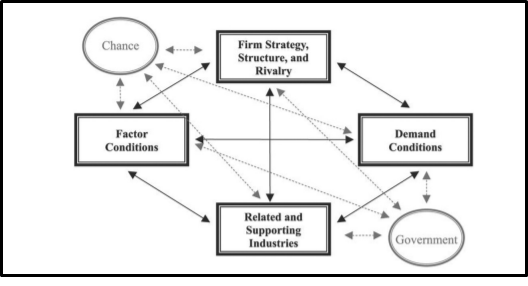
Figure 4: Porter’s Diamond-Model
(Source: Afzalet al. 2019)
2. Internationalisation strategy
There are a range of different internationalisation strategies that Ford Motors can consider for expanding its business in Iceland and these are multi-domestic, transnational, international and global expansion strategies. Multi-domestic international-strategy refers to an approach, through which organisations choose to focus on their commercial and advertising efforts on requirements of their local markets instead of adopting global or universal approach. Transnational-international strategy is adopted when organisations aim at conducting their activities across the international borders. It is a strategy through which organisations aim at becoming both local and global in a simultaneous manner. As cited by Mansarey (2020), transnational organisations communicate properly with competitors and customers for conveying success. These firms focus on maximisation of their local representativeness while making their global presence strong through adoption of proper strategies. On the other hand, Global-expansion strategies enable firms to make crucial choices through determination of target customers, resource allocations, channelling strategies and proper service and product offerings for making the presence of firms strong in the overseas market. Furthermore, Internationalisation-strategy of a firm focuses on selling firms’ services or products outside the domestic market for enhancing profitability to a significant extent. It can involve exports, business expansion in overseas markets and so on.
Amongst these four strategies of internationalisation, Ford Motor should opt for Transnational
Internationalisation-strategy for achieving its aim of establishing a subsidiary in the market of Iceland. As cited by Antuneset al. (2019), transnational-strategy can aid an organisation in achieving global integration while ensuring national responsiveness. Hence, if Ford Motors decides to adopt this strategy for its internationalisation in market of Iceland, it will be capable of developing independent subsidiary network for meeting strategic objectives of both national and international market. As this strategy helps in reducing development costs to a great extent. Ford motors should adopt this strategy for internationalisation of its business in market of Iceland. Apart from this, this would provide Ford Motors with an enhanced cultural understanding through which it can determine if its existing products would be appealing to new customers of Iceland. It would allow them to understand local culture of Iceland as this strategy helps organisations to interact effectively with local customers through local employees having proper understanding of culture. In the context of transnational international-strategy, subsidiaries are considered as semi-autonomous units that are connected strongly to MNC networks; however, employ local people for effective knowledge creation (Kawai and Chung, 2019). In Iceland, customers generally prefer expensive products; however, in US, Ford Motor has always focused on developing low-cost products for competing with other players in market. Therefore, Transnational international-strategy would be beneficial for understanding these differences effectively through local approach as local employees would be able to create effective knowledge regarding changes in customer preferences in Iceland. Through a localised market approach, it will become possible for Ford Motors to adapt its pricing or product strategies easily and hence, there will be ample opportunities for generating huge profit in market of Iceland.
3. Country analysis
a. PESL Framework
PESL framework includes“Political, Economic, Social and Legal elements”that affect operations of a business in a country. Political factors include Tariffs, trade restrictions, environmental regulations that can have significant influence on operations of Ford Motors. In Iceland, non-tariff trade-barriers have been shunned on many products especially on Zero-emission vehicles (Privacyshield.gov, 2021). Hence, it presents an attractive opportunity for Ford-Motors to make its EVs popular in this country while adhering to statutory requirements. Economic factors such as low unemployment-rate and huge economic growth will influence business of Ford Motors in a positive way as low-level of unemployment signifies huge ability of customers to purchase luxury products like cars. Therefore, the market of Iceland is attractive for Ford to enhance its profitability by attracting customers through its innovative luxury products. Social factors including huge population growth present opportunities for success of Ford Motors. In 2020, population grew by approximately 1.3% than previous year (Statista, 2021). Legal-factors including environmental legislation can have significant influence on Ford-Motors. Increased focus on making environment clean can have both positive and negative influence on Ford’s business as manufacturing operation of fuel cars can have huge emissions that can cause it to face legal obligations. On the other hand, increased focus on selling EVs and producing them will help it build good reputation through compliance with legal requirements.
b. Five forces
Five-forcesmodel developed by Porter involves following elements:
- Competition
- Buyer’s Bargaining ability
- Suppliers’ bargaining ability
- Substitution related fear
Fear for new entry in market
As discussed earlier, the market of vehicles in Iceland is one of the rapidly growing markets in this country and due to this;competitionis becoming intense day by day. BMW has already made its presence strong in the market of Iceland by launching one of the most demanded cars, Rolls-Royce Phantom (Bmwgroup, 2020). GM has also focused on entering this country. Hence, it will be a strong force for Ford Motors for its expansion in the Iceland market. Demand for electric vehicles has risen significantly in Iceland. Consumers can purchase these vehicles at low costs and hence, from this perspective customers’ bargaining-power force will be strong for Ford Motors.
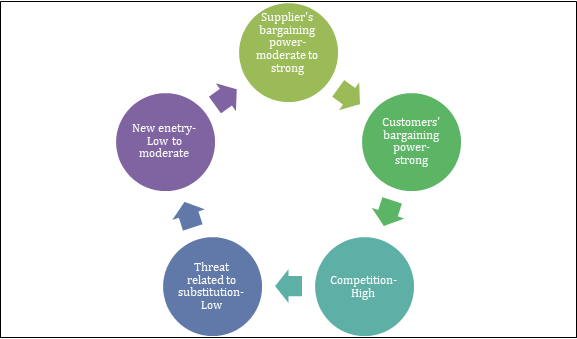
Figure 5: Porter’s five-forces for Ford
(Source: Author)
However, for other vehicles this force will continue to be low as there is less number of substitutes available in this market. It is an opportunity for Ford Motors to increase sale of its fuel vehicles as customers’ bargaining-power for these vehicles will continue to be low. In entire European market, supplier pool of vehicles has expanded significantly and hence, supplier-bargaining power does not present strong force to Ford Motors. Hence, it is an opportunity for Ford Motors to operate its business profitably in Iceland automotive market. Threats related to substitution are not much significant in Iceland’s market as no vehicle can substitute the value of cars. Hence, this will not be a significant force to Ford Motors. There exists a significant fear for new entry in the vehicle market of Iceland that can present a strong force to Ford Motors. For example, General Motor has decided to to enter this market of Iceland as EV industry of this country is expanding rapidly presenting huge opportunities for new entrants to become successful after expansion (Gmauthority, 2019). However, there are stringent regulatory-barriers that can present numerous challenges for new-entrants to expand their businesses in Iceland (Oecd, 2021). Apart from this, huge start-up costs can also prevent new entrants from entering this market. Hence, these factors make the force of new-entrants weak for Ford Motors.
4. Entry Mode and justification
There are different entry-modes available which include “Merger and Acquisition”, “Joint Venture”, “Franchising” and “Licensing.” Companies that focus on adopting merger-and acquisition often need to work collaboratively with other organisations for achievement of a shared goal or take over other organisations by purchasing stock-exchanges of weak companies. Licensing refers to a strategy through which one organisation gives another organisation permission to produce or manufacture former’s products in exchange of specified payment (Bond and Saggi, 2019). It is a form of cross-border agreement and it helps organisations to make huge profit while avoiding their overhead costs. Joint venture is one of the most preferred entry modes as it provides organisations with the opportunity to take advantages of partner company’s reputation, local knowledge and infrastructure. This mode is less risky, less capital-intensive and has minimum complications during the time of exit. One the other hand, Franchising is one of the contractual entry-modes or license agreements through which an organisation grants another organisation of foreign country right to utilise its brand name along with selling its services or products. In simple words, this model of entry allows different enterprises to share single brand-name. It is highly beneficial for businesses especially when entering a market having limited resources.
As Ford Motor has focused on establishing its subsidiary in Iceland, it should opt for development of an acquired subsidiary. Acquisition will be most beneficial entry mode for this company, as it will aid in gaining huge access to capitals, access to new ideas, reducing entry barriers and so on. Through acquisition, it will be able to establish a subsidiary in Iceland that would help in reducing its overhead costs while enhancing its profitability in market of Iceland. As cited by Zuhriet al. (2020), through acquisition and merger companies become capable of retaining their valuable and skilled employees and it helps them to create new knowledge every day. Besides that, in Iceland, there can be cultural clashes, which could be avoided through acquisition, as existing local employees will have good knowledge of the local culture. Hence, it will provide Ford with an opportunity to satisfy customers’ requirements in an effective manner. Besides that, Ford Motors will be able to enter market without facing many barriers. Transnational strategy would be helpful for this as it focuses on localised approach, which would benefit stakeholders of acquired firm as well.
Through acquisition of reputed brand and developing an acquired subsidiary Ford Motors will be capable of enhancing market share rapidly as it will be able to reach out to the existing customers of acquired organisation. For example, when making it entry in Sweden, Ford acquired Volvo that helped this company to make its presence strong in this country. Share of Ford increased rapidly by at least $ 62.50 within a few days. Volvo’s huge popularity helped Ford to capture a large market in Sweden through which its success was ensured.
5. Organisational and managerial problems
Most significant issue that Ford is likely to face after its expansion in Iceland is Cultural clashes. In Iceland there are huge cultural differences as compared to America. Most significant problem that Ford will face in Iceland will be due to the differences in Power-Distance cultures. In America, the power-distance score is 40, which is higher as compared to that of Iceland if Hofstede’s cultural-model is applied. 40 is a low score in terms of power-distance; however, there exist some differences between management and subordinates. According to this model, in countries with high power-distance-culture, organisations have set top-down culture for ensuring clear hierarchy and in countries having low power-distance culture organisations set flat structure for encouraging shared decision-making and employee involvement. In Ford motor, Ford has recently announced flattening of its bureaucratic management-culture for reducing differences in power (Dealernewstoday, 2019). However, still now it practices a bureaucratic culture that reflects its weakness in adopting a low power-distant culture.
Hence, it will be a challenge for this company to operate successfully in Iceland as in this country power-distance score is typically low and in this country most of the organisations focus on building a flat organisational structure for promotion of equality to encourage every employee to speak their voices. For example, Tesla has developed falt organisational-structure within which it encourages managers and leaders to promote equality across all levels of organisation. This has helped Tesla to succeed in new markets by creating knowledge. Ford needs to build its capability of reducing its differences in power for operating successfully in the automotive market of Iceland. It should cope with this difference by encouraging its employees at all levels to share their knowledge and value view-points of each other. Another issue that can be faced after expansion in Iceland is organisational coordination-related issues. Internal coordination is the most important factor for ensuring success during and after internationalisation of a business (Xiao et al. 2021). This can stem from huge distance amongst stakeholders of an organisation. Coordination of activities often becomes highly problematic during internationalisation. Especially, in an acquisition, coordination of internal working-relationships often become challenging that can reduce effectiveness of firms significantly. Organisations often end up setting unattainable targets after an acquisition that hinder success of new acquired subsidiary in foreign market. Besides that, if Ford continues to practice bureaucracy even after expansion in market of Iceland, there can exist risks of poorly defined responsibilities and roles, which can create immense dissatisfaction amongst employees and acquisition can become a failure.
Therefore, focus of Ford Motors should be on developing proper coordination within business after expansion to ensure its success in Iceland. Another organisational problem that can present huge challenges to this company is the problem regarding centralisation-decentralisation. It is essential for businesses to adopt a centralised approach for ensuring success of internationalisation. Centralisation on manufacturing can help in ensuring proper supervision over work processes and hence can ensure success of internationalisation (Abdullah and Adil, 2019). Ford currently has decentralised control on its operations such as manufacturing practices that can present challenges in ensuring success of this company in new countries such as Iceland. It often results in coordination difficulties as well. Therefore, it is crucial for this company to address these issues effectively for successful internationalisation in Iceland.
6. Recommendations to address issues
a. Sensitivity training and development of free and open-communication channels within organisation
The major issue that has been expected to have significant influence on international expansion is Cultural clash after expansion. To address this issue, Ford is required to focus on providing its employees with sensitivity training that would make employees at managerial levels aware of importance of respecting views of others and encouraging others to come up with new ideas. As cited by Artha and Etikariena (2020), sensitivity training can help organisations to develop empathy amongst their employees at different levels regarding difficulties of co-workers and this helping behaviour of employees across different levels can help in removing all kinds of power distance within an organisation. Apart from this, Ford can focus on building open channels of communication within organisation for encouraging employees to speak freely with managers and leaders regarding their problems. In Iceland, organisations are increasingly focusing on encouraging open communication for fostering innovation and enhancing satisfaction. Hence, Ford Motors should also focus on encouraging use of informal means of communication by its employees to establish a collaborative workplace.
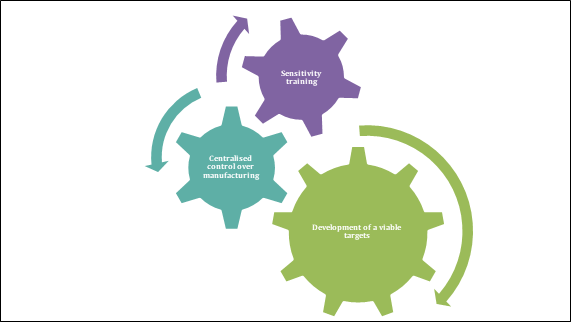
Figure 6: Recommendations
(Source: Author)
b. Development of a viable targets and communicating these with both new and existing employees Leaders of Ford Motors should ensure that they are creating viable targets for employees after acquiring firm in Iceland. There should be increased focus on ensuring well-being of employees by providing them with some autonomy. Most importantly, a proper structure should be developed within this organisation to facilitate communication of responsibilities and roles of each employee in an effective manner. This will aid in removal of ambiguity and will help this company to address possible coordination problems that can hinder achievement of its strategic goals. There should be clear communication channel within organisation for communicating responsibilities and roles of employees.
c. Centralised control over manufacturing
It is essential to develop flat structure within organisation; however, there should be centralised control over manufacturing operations of this organisation. As this company would expand in new country, lack of control over manufacturing can lead to waste of some resources and so on. Hence, centralised control on manufacturing while having flat organisational structure can ensure balance in organisational control in new market.
Conclusion
Finally, it can be concluded that Iceland would be a proper choice for Ford to expand its business. However, it is essential for this company to address a range of different issues before making its entry in this market. This market is suitable, as it has no significant entry barrier, high demand and so on. However, cultural differences and some other issues can present great challenge to this organisation. Therefore, strategic adoption of initiatives should be stressed for ensuring success.
Reference List
Abdullah, A. and Adil, M.A.M., 2019. Centralisation of Halal Matters Under the Federal Government in Malaysia: A Legal Perspective. ICR Journal, 10(2), pp.229-241.
Afzal, M., Lawrey, R. and Gope, J., 2019. Understanding national innovation system (NIS) using porter’s diamond model (PDM) of competitiveness in ASEAN-05. Competitiveness Review: An International Business Journal.
Antunes, I.C.M., Barandas, H.G. and Martins, F.V., 2019.Subsidiary strategy and managers’ perceptions of distance to foreign markets. Review of International Business and Strategy. 29 (4)
Artha, B.I. and Etikariena, A., 2020, November.Impact of Workplace Empathy Training on Employees’ Helping Behavior. Intervention and Applied Psychology (ICIAP 2019) and the 4th Universitas Indonesia Psychology Symposium for Undergraduate Research (UIPSUR 2019), pp. 243-254.
Bmwgroup, 2020.Our Responsibility, Our Future, viewed on 11/11/2021
Bond, E. and Saggi, K., 2019. Price controls versus compulsory licensing: Effects on patent-holders and consumers. The WTO and Economic Development, 303.
Dealernewstoday, 2019.Ford Announces 7,000 Layoffs to Flatten Bureaucratic Management Structure ,viewed on 11/11/2021
Kryeziu, L., Co?kun, R. and Krasniqi, B., 2021. Social networks and family firm internationalisation: cases from a transition economy. Strategic management assignmentReview of International Business and Strategy.2
Mansaray, H., 2020. Organizational Strategies and Performance in the Banking Industry Focused on the Transnational Banks in Sierra Leone: An Ex Post Facto Study. Budapest International Research and Critics Institute-Journal (BIRCI-Journal), pp.3185-3196.
Media.ford, 2021.FORD AGAIN LEADS AUTOMAKERS IN U.S. ASSEMBLY, HOURLY JOBS, UNDERSCORING COMMITMENT TO AMERICAN ECONOMY viewed on 11/11/2021
Privacyshield.gov, 2021.Iceland - Import Tariffs viewed on 11/11/2021
Theicct.org, 2018.Iceland is one of the world's most interesting electric vehicle markets viewed on 11/11/2021
Wang, O. and Werning, I., 2020. Dynamic oligopoly and price stickiness (No. w27536). National Bureau of Economic Research, Eo
Xiao, R., Yu, X., Xiang, T., Zhang, Z., Wang, X. and Wu, J., 2021. Exploring the coordination between physical space expansion and social space growth of China’s urban agglomerations based on hierarchical analysis. Land Use Policy, 109, p.105700.
Zuhri, S., Fahlevi, M., Abdi, M.N., Irma, D. and Maemunah, S., 2020. The impact of merger and acquisition on financial performance in Indonesia. Journal of Research in Business, Economics, and Education, 2(1).












